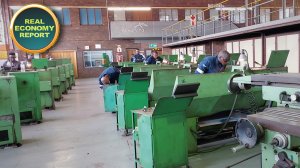From Creamer Media in Johannesburg, this is the Real Economy Report.
Sashnee Moodley:
With South Africa facing a critical shortage of skilled and qualified artisans and engineers, steel producer ArcelorMittal South Africa’s fully Quality Council for Trades and Occupations-accredited Engineering Academy, based in Vanderbijlpark, in Gauteng, offers artisan training to help address the technical skills gap in the country. Sabrina Jardim tells us more.
Sabrina Jardim:
Established in 1994, AMSA is recognised by the Manufacturing, Engineering and Related Services Sector Education and Training Authority (merSETA) as a platinum-ranked skills development company, and is a member of the Accelerated Artisan Training Program (AATP).
In a media presentation on September 26, AMSA learning and development manager Nicolene van Emmenes posited that an integrated approach to skills development can address current deficiencies in basic education, as well as help to increase the number of apprentices trained at further education and training (FET) colleges, and the quality of the training.
In the latter area, she noted, initiatives are being put in place to improve the quality of teaching and provide college lecturers with practical workplace experience.
She added that AMSA had based its skills development strategy on addressing issues within physical science and mathematics at the basic education level, as well as the skills development of the unemployed, thereby bolstering the required skills for the South African economy and addressing the business needs of AMSA.
AMSA learning and development manager Nicolene van Emmenes…
AMSA HR head Vusi Sampula...
Sabrina Jardim:
As part of its learner pipeline development, AMSA’s apprenticeship programme offers institutional training, as well as workplace exposure. The apprenticeship is a three-year learning programme, culminating in a trade test with a National Trade Certificate.
AMSA Engineering Academy junior manager Busisiwe Dhladhla noted that the academy offers apprenticeship opportunities for seven occupational trades. These are electricians, millwrights, mechanical fitters, fitters and turners, boilermakers, welders and instrumentation mechanicians.
Apprenticeships comprise 30% institutional training and 70% workplace exposure, and AMSA currently has 359 apprentices in training at the Engineering Academy.
AMSA Engineering Academy junior manager Busisiwe Dhladhla…
Sabrina Jardim:
Meanwhile, AMSA is actively involved in several initiatives to help address skills gaps in South Africa at a national level, assisting the departments of higher and basic education, as well as the business sector.
Given that the QCTO now oversees the accreditation for occupational qualifications and programmes, Van Emmenes noted that AMSA assisted with curriculum development for new occupational qualifications linked to the QCTO.
As previously reported in Engineering News, legacy qualifications and singular unit standards expired on June 30. Hence, anyone wishing to enrol learners or employees for skills development will, therefore, need to be QCTO-accredited.
Consequently, while AMSA was previously accredited for legacy qualifications, the company is now accredited to provide occupational qualifications.
The AMSA Engineering Academy has been fully QCTO accredited since 2022 and is expecting to have its first candidates qualifying in October this year.
Dhladhla noted that on the legacy qualification, only students from the colleges with N-courses from N3 up to N6 could qualify.
On the new occupational qualification, matriculants with Physical Science, Mathematics and English at 50% level, also qualify for the apprenticeship programme.
AMSA HR head Vusi Sampula…
AMSA trainee apprentice Nonhlanhla Mazibuko…
AMSA artisan Philip Terblanche...
Sabrina Jardim:
Van Emmenes highlighted AMSA’s role in the Master Steel Plan project, a development initiative in collaboration with MerSETA.
She explained that AMSA has engaged with the Department of Trade, Industry and Competition and MerSETA to develop an expanded skills programme in the form of apprenticeships and metal’s production learnerships.
MerSETA has provided a R62-million funded investment for 300 production learners and 200 apprentices on a registered structured learning programme at AMSA on a 30-month project, which began in January.
Recruitment for the project is complete and all registered learners have begun with their learning programmes.
AMSA also offers university bursaries for engineering students and for employees wishing to further their studies.
AMSA learning and development manager Nicolene van Emmenes…
Sashnee Moodley:
That’s Creamer Media’s Real Economy Report. Join us again next week for more news and insight into South Africa’s real economy. Don’t forget to listen to the audio version of our Engineering News daily email newsletter.
Edited by: Creamer Media Reporter
EMAIL THIS ARTICLE SAVE THIS ARTICLE
ARTICLE ENQUIRY
To subscribe email subscriptions@creamermedia.co.za or click here
To advertise email advertising@creamermedia.co.za or click here












